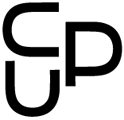What Is Affordable Housing?
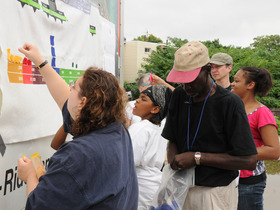
WHAT IT IS. “Affordable Housing.” The phrase seems plain enough, but it doesn’t always mean what people think it does! It actually has a technical government definition that can determine what gets built and who lives there. Use these tools to answer the all-important question: “Affordable to whom?”
This set of activities breaks down affordable housing policy into easy-to-understand visuals. Look at income demographics, rents, and proposed developments in your neighborhood. Learn about affordable housing programs and who’s eligible for them … more
What Is Zoning?
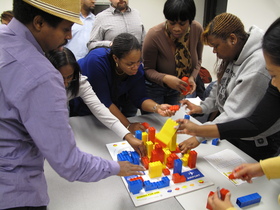
WHAT IT IS. Zoning law regulates land use across the city and shapes buildings, blocks, and whole neighborhoods. It can be a tool for preservation or for rapid physical and economic development.
How does it work? Why is it so controversial? This set of activities explains the zoning of density, bulk, land use, and how proposed rezonings could affect your neighborhood. Learn the basics (or build up to topics like inclusionary and contextual zoning) while maxing out your lot with plastic block buildings or laying out a brand new city … more
What Is ULURP?
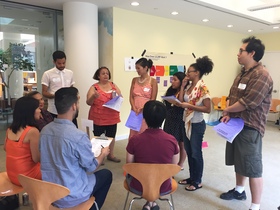
WHAT IT IS. ULURP may sound like a monster (and some people think it is), but it stands for Uniform Land Use Review Procedure and it’s the process by which major land use changes get reviewed and approved in New York City. It’s long, complicated, and involves lots of players, making it difficult for communities to understand how they can have a say in the land use decisions that impact their neighborhoods … more
Sewer In A Suitcase
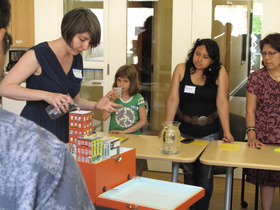
WHAT IT IS. New York City uses over one billion gallons of water every day. What happens to it after we’ve used it? New York relies on something called a combined sewer system. Stormwater from streets and rooftops is collected into the same network of pipes as dirty water from toilets, sinks, and showers. When it rains a lot, the combined sewage and stormwater overflow directly into local waterways.
CUP’s Sewer in a Suitcase is a working model of the city’s combined sewer system that lets you explore the mechanics of these dirty events and what they mean for our health and environment—all from your own classroom! … more
Neighborhood Futures
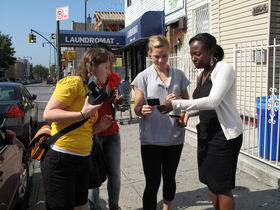
WHAT IT IS. Who decides what gets built in your neighborhood? And who does development benefit? In this professional development workshop for educators, CUP gives you the tools to lead hands-on activities to help your students imagine possible futures for your school’s neighborhood. Teachers learn how to find a site in their community and work with students to identify a variety of potential users and stakeholders. What would different groups want out of this space? Teachers then learn specific design activities they can use to help their students imagine alternate futures for the space from the perspective of various stakeholders. These activities spark conversations about who gets to change places, who benefits from those changes, and students’ hopes and dreams for their neighborhood … more
What’s The Trade-Off?
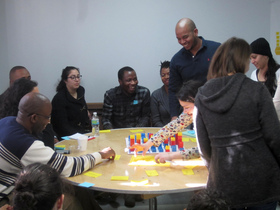
WHAT IT IS. The mayor’s ambitious affordable housing agenda will be realized through the rezoning of over a dozen neighborhoods across New York City’s five boroughs. While many communities are eager to see more affordable housing, they are concerned about what new development could mean for their communities, and whether they will be able to play a meaningful role in the decision-making that shapes them.
The Center for Urban Pedagogy (CUP) is developing What’s the Trade-Off? to help communities more effectively participate in the process. Using hands-on activities with a gameboard and plastic blocks, workshop participants use a scaled-down version of their neighborhood to explore what a proposed rezoning could (and should) look like … more
